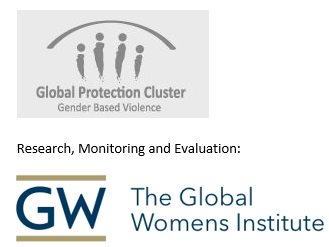- The Convention on the Rights of Persons with Disabilities (CRPD) requires that the protection of human rights through laws, policies, and services be extended to all persons with disabilities (Barriga, 2011; also see International Disability Alliance, 2008). However this is often not enforced or honored, and women and girls with disabilities continue to suffer discrimination and increased risk of violence. Special consideration must be given to women and girls with disabilities throughout all programming activities to help prevent and address violence against them. The following are recommendations to improve the safety and well-being of persons with disabilities in conflict-affected settings (adapted from Human Rights Watch, 2010; and UNHCR, 2011.)
- Conduct full needs assessments of people with disabilities. Ensure that people with disabilities – especially children – are accounted for, registered, and provided with appropriate documents during displacement and resettlement.
- Disseminate information about rights and available services in ways all women can access, regardless of literacy level or ability. Make information available to women who are deaf, blind, or illiterate.
- Conduct trainings and workshops on disability issues. Raise awareness of applicable international, regional, and national law regarding the rights of persons with disabilities. Advocate for the inclusion of disabilities as a priority issue for government programmes and budgetary spending. Get caretakers and family members involved in campaigns and outreach activities.
- Provide outreach and training to women and girls with disabilities, their caretakers, and families on the risk of violence. Educate and raise awareness on how to recognize, prevent, avoid and report violent, abusive or exploitative situations.
- Advocate for the provision of appropriate accommodations in courtrooms, healthcare facilities, police stations and other locations where women with disabilities are denied access. These provisions include ramps, sign language interpretation, Braille and large print of documents, accessible rooms and podiums, and training of staff on how to respectfully communicate with women with disabilities.
- Monitor the adherence of hospitals, organizations and government institutions to laws and policies requiring access to individuals with disabilities.
- Scale up rehabilitation programmes for those who have been injured and disabled due to conflict and violence, such as landmine survivors.
- Aid given to women with disabilities may increase the risk of backlash from community members who view it as “special treatment.” As with aid given to any marginalized population, special precautions must be considered to prevent such backlash:
- Ensure full consultation with organizations representing people with disabilities prior to designing and implementing programmes or giving aid.
- Consider possible consequences that aid and programmes might have on women and girls with disabilities.
- Ensure all women the autonomy to decide their course of action, and guarantee that they are fully informed of their choices and consent to programming decision.
- Involve women and girls with disabilities in leadership and decision-making in the design, implementation and evaluation of programmes. Support and build capacity of disabled persons organizations.
- Ensure the distribution of food and non-food items in refugee and IDP camps are accessible to women and girls with disabilities, for example by providing transportation support, door-to-door distribution, and smaller packages. Monitor distribution for exploitation, discrimination and extortion.
- Advocate for and prioritize the reunification of women and girls with disabilities with their caretakers and family members.
Additional Tools
SOURCE: International Online Resource Centre on Disability and Inclusion. Source is an International Online Resource Centre designed to strengthen the management, use and impact of information on disability and inclusion in development and humanitarian contexts. It is primarily intended for use by practitioners and academics.
For more detailed recommendations from Human Rights Watch (specifically targeting Uganda but may be tailored to other conflict-affected areas) see Human Rights Watch, 2010, “‘As If We Weren’t Human’: Discrimination and Violence against Women with Disabilities in Northern Uganda”, p. 68-72.
Additional Resources
For research and preliminary recommendations from CREA on reducing violence against disabled women, see CREA. 2012. “Count Me In! Research Report on Violence against Disabled, Lesbian, and Sex-Working Women in Bangladesh, India, and Nepal.” New Delhi: CREA., p. 149.
|
Organizations Working with Disability Rights |
|
|
International Disability Alliance
|
The International Disability Alliance was established in 1999 as a network of global and regional disabled people’s organizations. Its aim is to promote the effective and full implementation of the UN Convention on the Rights of Persons with Disabilities (CRPD) worldwide, as well as compliance with the CRPD within the UN system.
|
|
|
Handicap International is an aid organization working in situations of poverty and exclusion, conflict and disaster, to improve the living conditions or people with disabilities and promote respect for their dignity and fundamental rights. |
|
|
Among other areas, Women’s Refugee Commission focuses multiple programs on the rights and needs of women with disabilities.
|
|
Global Disability Rights Library (GDRL)
|
The US International Council on Disabilities has helped to develop the (GDRL), a broad collection of critical resources for disabled people’s organizations, women’s rights groups, government agencies, academic institutions and others that advocate for disability rights.
|
